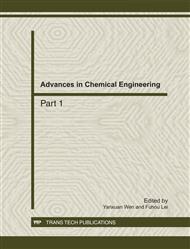[1]
Sofos, J., Beuchat, L. Davidson, P., Johnson, E. Naturally occurring antimicrobials in food. Task Force Report No.132. Council for Agricultural Science and Technology, Ames, IA. (1998), p.103.
Google Scholar
[2]
El-Nakeeb M., Yousef R. Study of antimicrobial action of pectin.I. Antibacterial and antifungal activities of pectin. Planta Med 18:201-209 (1970).
DOI: 10.1055/s-0028-1099767
Google Scholar
[3]
El-Nakeeb M., Yousef R. Study of antimicrobial action of pectin.II. Factors effecting the bactericidal activity of pectin. Planta Med 18:295-302 (1970).
DOI: 10.1055/s-0028-1099782
Google Scholar
[4]
Takenaka T., Muto O., Yasunami K., Echigo T. Antibacterial Activity of Pectin Hydrolyzates. Jap Soc Food Sci Technol 41:785-792 (1994).
DOI: 10.3136/nskkk1962.41.785
Google Scholar
[5]
Wang N., Zhang C., Jin S., Li T. Extraction and food chemical characterizations of haw pectins. Sci Technol Food Ind 28:87-92 (2007).
Google Scholar
[6]
Li S., Li T., Zhu R., Wang N., Song Y., Wang S., Guo M. antibacterial activity of haw pectic oligosaccharides. Int. J Food Prop (2011) in press.
Google Scholar
[7]
Wang N., Li J., Jin S., Li T. The conditions for the production of pectic oligosaccharides from haw pectin. Food Res Dev 29:1-4 (2008).
Google Scholar
[8]
Du L., Li T., Wang N., Guo M., Zhang H. Antioxidant activity of haw pectin hydrolyzates. Food Res Dev 30:18-21 (2009).
Google Scholar
[9]
Back S., Jin H., Lee S. Inhibitory effect of organic acids against Enterobacter sakazakii in laboratory media and liquid foods. Food Control 20:867–872 (2009).
DOI: 10.1016/j.foodcont.2008.11.002
Google Scholar
[10]
Matsuda T.. Antibacterial activities of organic acids. J. Food Hyg Soc Jap 45: 189-196 (2004).
Google Scholar
[11]
Greer G., Dilts B. Lactic acid inhibition of the growth of spoilage bacteria and cold tolerant pathogens on pork. Int. J Food Microbiol 25:141-151 (1995).
DOI: 10.1016/0168-1605(94)00088-n
Google Scholar
[12]
Ouwehand A. In: S. Salminen, A. von Wright (Eds.), Antimicrobial Components from Lactic Acid Bacteria, Dekker, New York, (1998), p.139–159.
Google Scholar
[13]
Russell, J., Diez-Gonzalez, F. The effects of fermentation acids on bacterial growth. Adv Microb Physiol 39:205–234 (1998).
Google Scholar
[14]
Barker, C., Park, S. Sensitization of Listeria monocytogens to low pH, organic acids, and osmotic stress by ethanol. Appl Environ Microbiol 67:1594–1600 (2001).
DOI: 10.1128/aem.67.4.1594-1600.2001
Google Scholar
[15]
Matsuda T., Yano T., Maruyama A. Antibacterial activity of organic acid. J. Food Sci Technol 41:687-702 (1994).
Google Scholar


